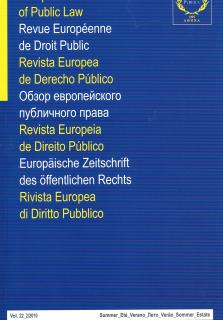
Administrative Law / Droit administratif
France
Pascale Gonod
The consultative function of the Council of State has been renewed by the constitutional revision of 2008, through an extension of law proposals, mechanism which is today complete and enforced; the traditional consultative function of the Council of State, that of the counselor of the government, still exists and has been used during the legislative procedure at the end of which the Executive intends, contrary to the opinion of the Council of State, to adopt a law which will generally prohibit the wearing of the integral veil. The reform of the organisation and the functioning of the administrative jurisdiction is still progressing: the decree of the 22nd of February 2010 contains measures intended to facilitate dispute treatment, and is part of the wider movement towards a progressive reconfiguration of administrative justice. In accordance with the hierarchy of norms, the mechanism concerning the formulation of a priority question of constitutionality is adopted through the promulgation of the law of the 10th of December 2009 and the publication of the decree of the 16th of February 2010, and the Council of State which has reached with the first questions the Constitutional Council, seems considering to adopt a large conception of that transmission’s conditions. Moreover, the administrative jurisdiction has decided the invocability, by individuals, of Community directives when, in case of non-transposition, they are precise and unconditional, returning to its previous case law. The judge has also intervened within the framework of the reform of the judicial map, by exercising control of the acts realising it, as concerning the organisation of the public service of justice and deepens even more the function of the administrative judge of the contract which is brought to that of the judge of validity of contracts within the framework of disputes of full jurisdiction. The administrative organisation experiences transformations, not only in terms of territories, but also at the level of central administrations.
La fonction consultative du Conseil d’Etat a été renouvelée par le jeu de la révision constitutionnelle de 2008, par une extension aux propositions de loi, dispositif qui est aujourd’hui complet et mis en œuvre; la fonction consultative traditionnelle du Conseil d’Etat de conseiller du gouvernement continue à être mise en œuvre, et l’a été dans le processus législatif au terme duquel l’exécutif entend, contre l’avis du Conseil d’Etat, faire aboutir une loi d’interdiction générale du port du voile intégral. La réforme de l’organisation et du fonctionnement de la juridiction administrative progresse encore[1]: le décret du 22 février 2010 comporte des mesures propres à faciliter le traitement des litiges, et s’inscrit dans le mouvement plus ample d’une reconfiguration progressive de la justice administrative. Au titre de la hiérarchie des normes, le dispositif relatif à la formulation d’une question prioritaire de constitutionnalité est arrêté du fait de la promulgation de la loi du 10 décembre 2009 et la publication du décret du 16 février 2010, et le Conseil d’Etat qui a saisi des premières questions le Conseil constitutionnel, semble entendre adopter une conception large des conditions mises à cette transmission. Par ailleurs, la juridiction administrative a décidé de l’invocabilité des directives communautaires par les particuliers, dès lors que, non transposées, elles sont précises et inconditionnelles, revenant sur sa jurisprudence antérieure. Le juge est également intervenu dans le cadre de la réforme de la carte judiciaire, en opérant un contrôle des actes la réalisant, en tant que portant sur l’organisation du service public de la justice et approfondit encore la fonction du juge administratif du contrat qui est portée à celle de juge de la validité des contrats dans le cadre du contentieux de la pleine juridiction. L’organisation administrative connaît des mutations, non pas seulement sur le plan des territoires, mais également au niveau des administrations centrales.
[1] Voir cette Revue, chronique de droit administratif précédente, p. 1617.





















